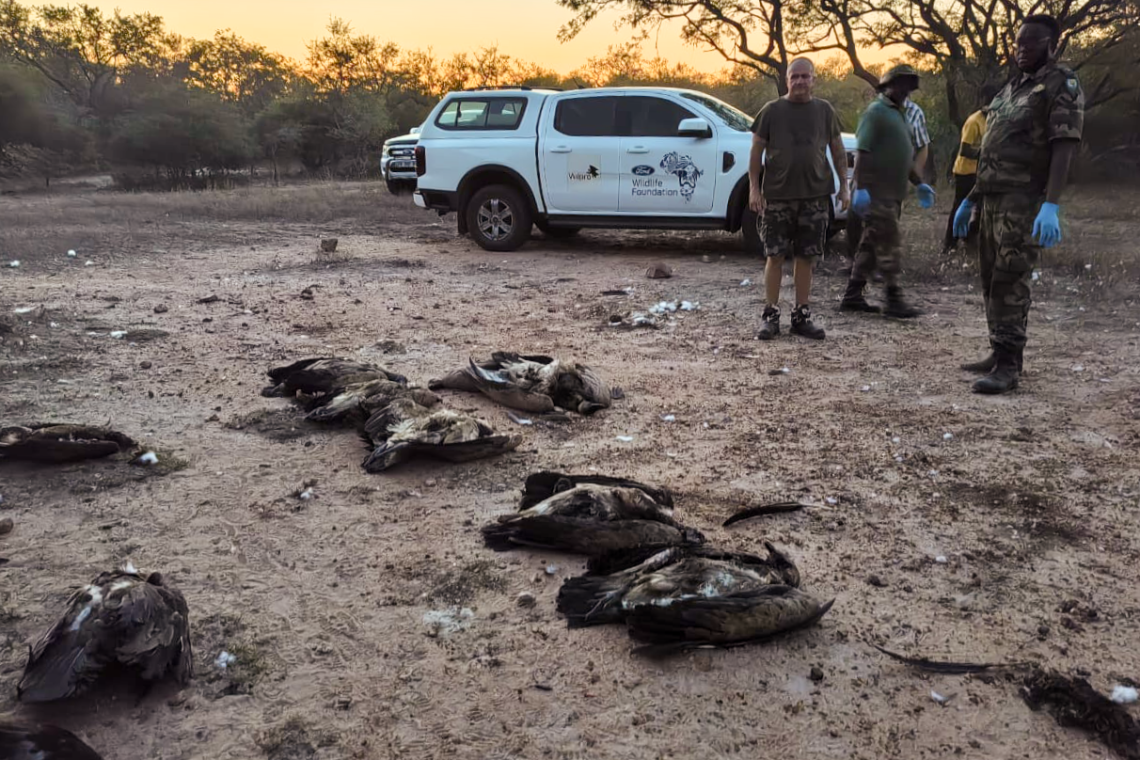Over 100 Vultures Poisoned in Mpumalanga Game Reserve, Conservationists Sound Alarm

A mass poisoning event in the Lionspruit Game Reserve, near Marloth Park, Mpumalanga, has resulted in the tragic loss of over 100 vultures, delivering a catastrophic blow to species already facing a severe risk of extinction, conservationists have reported. The grim discovery was made on 18 May 2025 by rapid response teams from Vulpro and Wild and Free Rehabilitation Centre, who were monitoring real-time GPS signals from previously rehabilitated birds.
The incident underscores the extreme vulnerability of these magnificent birds, with the death toll including:
- 92 White-backed Vultures (Gyps africanus): This species is listed as Critically Endangered on the IUCN Red List. Its global population has plummeted by over 90%. In South Africa, the situation is dire, with estimates indicating only around 4,000 breeding pairs or approximately 7,350 mature individuals remaining (Source: Vulpro; Wildlife ACT; IUCN Red List). Tragically, 90 per cent of the White-backed Vultures found dead were breeding adults.
- Nine Hooded Vultures (Necrosyrtes monachus): Also globally Critically Endangered (IUCN Red List), the Hooded Vulture faces an even more precarious existence within South Africa. The national population is estimated to be a mere 50-100 breeding pairs, which translates to a fragile count of roughly 100-200 mature individuals (Source: Vulpro; Wildlife ACT; Mongabay; IUCN Red List).
- One adult White-headed Vulture (Trigonoceps occipitalis): This species shares the Critically Endangered status on the IUCN Red List. In South Africa, its numbers are alarmingly low, with estimates of only about 80-100 breeding pairs, or around 160 mature individuals. This species has already suffered localised extinction of breeding populations in regions such as KwaZulu-Natal (Source: Vulpro; Wildlife ACT; Project Vulture; IUCN Red List).
The carcasses of these critically endangered vultures were found scattered around a deliberately poisoned warthog carcass. Field assessments confirmed that no survivors were detected at the scene. Notably, initial reports indicate that no body parts were removed from the vultures, a detail that can sometimes offer clues to the motive in such poisoning incidents.

Investigation and official response
Field rangers from the Nkomazi municipality, joined by SANParks aerial support, confirmed the scene was deliberately contaminated. “The scale of this poisoning is devastating and appears to be part of a much bigger, targeted operation. With multiple incidents taking place in various regions across the Lowveld recently, we suspect they are aimed at detracting us from a bigger and even more devastating event in the near future,” said Kerri Wolter, CEO of Vulpro. She added that the slaughter—particularly of breeding adults during nesting season—constitutes an “ecological crisis” that threatens to undo decades of conservation work.
Lab testing and legal action
Samples collected alongside expert toxicologist Dr Gerhard Ver
doorn and wildlife veterinarian Dr Peet Venter will undergo laboratory testing to identify the poison used, with a view to supporting legal action. Vulpro has urged all rehabilitation centres in the Lowveld to halt releases until poisoning threats are fully investigated and mitigated.
New emergency response unit
Just days before the incident, Vulpro and Wild and Free formalised a partnership to establish a vulture emergency response unit in Mpumalanga. The unit offers rapid field intervention, specialist veterinary care at Wild and Free’s clinic, and long-term rehabilitation and tracking through Vulpro’s national programme. The initiative also draws on support from conservation groups WeWild Africa and Over and Above Africa, linking veterinary expertise, field operations and strategic planning across provincial borders.
A call to arms
“This is not just about one event. It’s about a systemic threat to our natural balance,” Wolter said. “We are fighting for every egg, every nest, and every vulture’s future. Through science, integrity, and collaboration, we will hold the line.” Investigations into the poisoning remain ongoing, and teams continue to decontaminate the reserve to prevent further wildlife deaths.
This article was curated, reviewed, and verified by the Conservation Mag team.
Information provided by Vulpro.
Discuss this article

Vultures turn death into life transforming what is lost into something that sustains us all. But they are disappearing. In some regions, populations have crashed by 95% in just three decades. This International Vulture Awareness Day, Vulpro confronts a harsh reality: without immediate action, these irreplaceable guardians of our ecosystems will vanish within our lifetime.
Few creatures perform such a vital yet misunderstood role as the vulture. These prehistoric-looking raptors, with their imposing wingspans and weathered faces, serve as Africa's silent guardians, aiding in the prevention and spread of diseases like anthrax, botulism, and rabies that would otherwise devastate both wildlife and human communities. Without their swift and efficient disposal of carcasses, our landscapes would become breeding grounds for pathogens, and populations of less efficient scavengers like feral dogs and rats would surge, bringing their own health risks.
Survival threats
Yet despite their crucial ecological service, vultures face an uphill battle for survival. Many of the large African vultures only reach sexual maturity at seven years old, laying just one egg per year. Even in ideal conditions, survival rates hover around 5%. Combined with human threats like poisoning, powerline collisions, and hunting for traditional medicine, it's clear why we need to pay the crisis more attention.
Across South Africa, 160 vultures are sold annually for traditional medicine, with people seeking claws, bones and skulls believing they possess clairvoyant powers. This demand drives destructive harvesting, particularly poisoning, which can wipe out dozens of birds in a single event.
Clicking links may earn us commission. . Stock images by Depositphotos.
Subscribe: Stories about wildlife, habitats and heroes
Welcome to Conservation Mag where we celebrate nature preservation through ecotourism and wildlife travel while we look for ways to preserve our heritage by supporting nature conservation. Starting conversations about the positive action people like you and I are taking to make a change.
Quick Links
Work With Us
![]()

